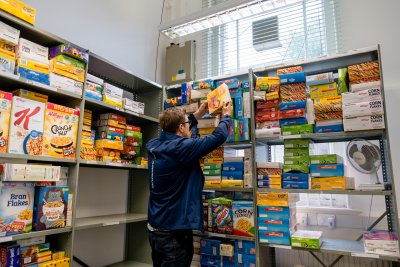 Fruit and vegetables greengrocers stall. Credit: cktravels.com / Shutterstock
Fruit and vegetables greengrocers stall. Credit: cktravels.com / Shutterstock

Updated National Planning Policy for England falls flat
Sustain’s call for national planning policies for England which will achieve an environmentally friendly, healthy, equitable and secure food and farming system falls on fallow ground.
After nine months of wait, the NPPF has been republished with only minor tweaks to the draft version, failing to bring to life any real reforms.
A draft revision to the National Planning Policy Framework (NPPF) for England was published early in 2023 for consultation alongside a wider consultation on planning reforms.
Sustain's submission highlighted how the planning system should be supporting a good food environment. Whilst the agenda for the consultation was predetermined by a set of specific questions, our response covered planning issues on food growing at all scales, climate, and building a healthy food environment.
We want planning reforms to acknowledge that a good food system delivering a good food environment contributes to the achievement of sustainable development. After all, sustainable food systems deliver multiple public benefits.
Sustain, for example, highlighted where planning has no control over protection of land used specifically for growing food; yet that text has not been reworded.
What's next?
The Levelling Up, Housing and Communities Committee Children, young people and the built environment Inquiry has called for evidence on how better planning and building and urban design in England could enhance the health and well-being of children and young people, while also benefitting the population as a whole.
Sustain submitted evidence in December 2023. In summary, we made the following recommendations:
- Progress national development management policies to avoid duplication and inefficient use of resources by each local planning authority.
- National strategies on obesity and public health should provide evidence for local plan policies. Local authorities should not have to provide evidence through a multitude of individual local studies.
- Make climate change a material planning consideration as this affects the long term health of children.
- Look at the definition of “amenity” in the advertising regulations so the effect on children’s mental and physical health can be taken into account in decisions.
- Tackle pollution from waste from intensive agriculture (which makes up 25% particulate pollution in cities).
- Ensure access to open space at home and at school with the opportunity to be used for food growing.
- Require new development to include opportunities for food growing.
- Set national internal space standards with adequate kitchen and dining space in homes and schools.
- Ensure new development is part of a walkable neighbourhood with easy access to services and healthy food linked by green routes planted for biodiverse and edible landscaping.
Many of these points affect the whole community, not only children and young people.
We are consistently responding to major consultations on the reforms to the planning system and calling for a clearer national statement on sustainable development and the role of working towards/not compromising a sustainable food system.
Planning authorities in Sustainable Food Places would be helped in their local plan making if there was specific national planning policy on achieving a sustainable food system.
In the meantime, local food partnerships can use the local planning policies to bring about a sustainable food system. Our toolkit shows how.
Planning Food Cities: Shaping the future of local areas to create a more sustainable and local food system.
Sustain
The Green House
244-254 Cambridge Heath Road
London E2 9DA
020 3559 6777
sustain@sustainweb.org
Sustain advocates food and agriculture policies and practices that enhance the health and welfare of people and animals, improve the working and living environment, promote equity and enrich society and culture.
© Sustain 2026
Registered charity (no. 1018643)
Data privacy & cookies
Icons by Icons8







